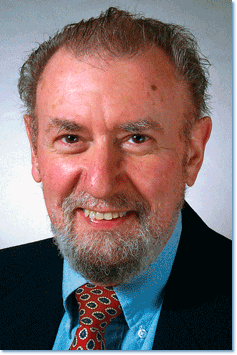 Historian of the United States, Recipient of the Dunning Prize
Historian of the United States, Recipient of the Dunning Prize
Paul Boyer, Merle Curti Professor of History, emeritus, at the University of Wisconsin–Madison, passed away on March 17, 2012. A scholar of tremendous range and curiosity, he traversed virtually the entire chronology of American history, writing about subjects as diverse as colonial political rhetoric and the Branch Davidians. His books dealt most centrally with intellectual, cultural and religious reactions to social dislocation and perceived moral decay: the Salem witch panic of 1692 (Salem Possessed, co-authored with Stephen Nissenbaum, 1974); 19th- and 20th-century movements to fight vice, whether by conforming city dwellers' mores and behavior to reformers' moral visions (Urban Masses and Moral Order in America, 1820–1920, 1978) or by bowdlerizing texts (Purity in Print, 1968, 2nd ed., 2002); and post-1945 confrontations with the possibility of mass extinction, whether from nuclear annihilation (By the Bomb's Early Light: American Thought and Culture at the Dawn of the Atomic Age, 1985) or the Apocalypse (When Time Shall Be No More: Prophecy Belief in Modern American Culture, 1992). Awarded the American Historical Association's Dunning Prize, Salem Possessed transformed the study of New England witchcraft, but Boyer's oeuvre overall is distinguished less for its argumentative precocity than for its meticulous research, attention to nuance, the integrity of its interpretations, and an abiding concern with the effects of moral judgments both in and on history.
Born on August 2, 1935, Boyer grew up in Dayton, Ohio, attending a mission of the Brethren in Christ Church that his grandfather founded, an institution whose early history he chronicled in his most personal work, Mission on Taylor Street (1987). Although he eventually left the church, his background allowed him to exposit religious viewpoints—even those he strongly questioned—with clarity and insight, while its Mennonite values informed the lifelong commitment to pacifism that inspired Fallout: A Historian Reflects on America's Half-Century Encounter with Nuclear Weapons (1998). A declared conscientious objector, he served two years in UNESCO's International Voluntary Work Camps in Paris before matriculating at Harvard, where he received his AB (1960), MA (1961), and PhD (1966). While a graduate student, he became an assistant editor for Notable American Women (three volumes, 1971), a signal contribution to the then-emerging subject of women's history. Assessing the compendium's status years later, his colleague Gerda Lerner, one of the field's acknowledged founders, remarked that he should be better known as a fellow pioneer. In 1967 he took a position at the University of Massachusetts at Amherst, moving to UW–Madison in 1980, where he mentored 22 students for the MA and 24 for the PhD. He retired from the faculty in 2002, but not from scholarship, for he continued to edit the "Studies in American Thought and Culture" series for the University of Wisconsin Press, deliver invited lectures, contribute to both academic and popular journals, and serve as an expert consultant for the media, especially on the subjects of nuclear culture and biblical prophecy.
Boyer's research earned him an array of academic honors: Guggenheim and Rockefeller Foundation Fellowships; election to the American Antiquarian Society, the Society of American Historians, and the American Academy of Arts and Sciences; dozens of invited lectures across the United States and Europe; and visiting appointments at UCLA, Northwestern, SUNY-Plattsburgh, and, in retirement, the College of William & Mary. Professional organizations, granting agencies and presses such as the American Antiquarian Society, Syracuse University Press, and the Wisconsin Humanities Council eagerly sought his council. He once chaired the Program Committee of the Organization of American Historians, sat on its executive board, and joined the Journal of American History's board of editors. During the 1990s he directed UW–Madison's Institute for Research in the Humanities. His intellectual breadth also made him an ideal editor for general references like The Oxford Companion to United States History (2001), and a writer of textbooks. He authored two by himself—Promises to Keep: The United States Since World War II and The American Nation—and collaborated on two more—The American Nation in the Twentieth Century and The Enduring Vision. He was engaged in revising the latter book, among other projects, when a sudden diagnosis of terminal cancer and rapidly declining health precipitated his determined effort to fulfill all his near-term commitments. As the end approached, he confided that, although updating paragraphs that he had tended so often might seem utterly inconsequential given the circumstances, he still found the task utterly absorbing. This dedication to scholarship underwrote his accomplishments as a historian; such equanimity in the face of death marks his measure as a man.
—Charles L. Cohen
University of Wisconsin-Madison
Tags: In Memoriam
Comment
Please read our commenting and letters policy before submitting.






